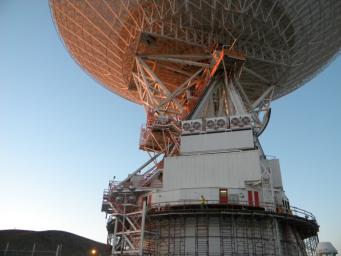
|
Mars Antenna Ready for Surgery
- Click the image above for a larger view
- Full-Res JPEG (3648 x 2736) (965.1 kB)
- Full-Res TIFF (3648 x 2736) (29.9 MB)
Caption:
As the sun sets on July 8, 2010, workers prepare to pour new epoxy grout for the hydrostatic bearing assembly of the giant "Mars antenna" at NASA's Deep Space Network communications site in Goldstone, Calif. The new epoxy grout is part of a major surgery for the 70-meter-wide antenna. The mixing and pouring of the grout was done at night to ensure lower, more stable temperatures and avoid working in the 100-plus-degree temperatures that are common in the Mojave Desert this time of year.
3.1 million kilograms (7 million pounds) of the antenna weight have been propped up to enable access to the hydrostatic bearing assembly, which is at the top of the pedestal under the dish.
While officially dubbed Deep Space Station 14, the antenna picked up the Mars name from its first task: tracking the Mariner 4 spacecraft, which had been lost by smaller antennas after its historic flyby of Mars.
Background Info:
For more information about the Deep Space Network, visit http://deepspace.jpl.nasa.gov .
Cataloging Keywords:
| Name | Value | Additional Values |
|---|---|---|
| Target | Earth | Mars |
| System | ||
| Target Type | Planet | |
| Mission | Deep Space Network (DSN) | Mariner |
| Instrument Host | Goldstone Deep Space Communications Complex (GDSCC) | |
| Host Type | Ground-Based Observatory | Flyby Spacecraft |
| Instrument | Deep Space Network Antenna | Goldstone Solar System Radar |
| Detector | ||
| Extra Keywords | Color, Radar, Radio | |
| Acquisition Date | ||
| Release Date | 2010-07-15 | |
| Date in Caption | 2010-07-08 | |
| Image Credit | NASA/JPL-Caltech | |
| Source | photojournal.jpl.nasa.gov/catalog/PIA13270 | |
| Identifier | PIA13270 | |
